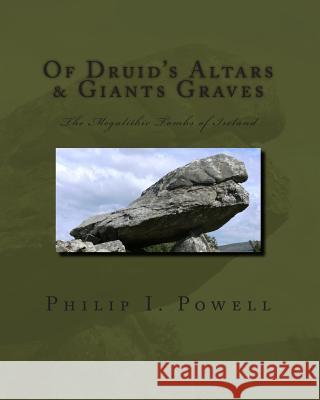Of Druid's Altars & Giants Graves: The Megalithic Tombs of Ireland » książka
Of Druid's Altars & Giants Graves: The Megalithic Tombs of Ireland
ISBN-13: 9781469950372 / Angielski / Miękka / 2012 / 344 str.
Of Druid's Altars & Giants Graves: The Megalithic Tombs of Ireland
ISBN-13: 9781469950372 / Angielski / Miękka / 2012 / 344 str.
(netto: 267,50 VAT: 5%)
Najniższa cena z 30 dni: 280,88
ok. 16-18 dni roboczych
Bez gwarancji dostawy przed świętami
Darmowa dostawa!
Prehistory in Ireland, from the archaeological evidence thus far discovered, begins around the 8th-7th millennia BC, a few centuries after the last great Ice Age, when Mesolithic hunter-gatherers arrived on the ancient shores of this island. Our earliest known evidence of human activity in Ireland is from around 8,000 BC, where archaeologists discovered shell middens along the coast of County Antrim. Shortly before 4,000 BC, farming was introduced into Ireland and this move from the Mesolithic hunter gatherer culture to a Neolithic farming society, was the single greatest social revolution there has ever been. The most prominent remains of this early prehistoric period are the megalithic tombs, 'Tuama Meigiliteach', the majority of which were constructed in the 4th & 3rd millennia BC (4000-2000 BC). These are the 'Giant's Grave' & 'Druid's Altar' of the Victorian Antiquarians, the 'Leaba Dhiarmada agus Ghrainne' of popular folklore and the 'Cromlech' and 'Dolmen' of earlier writers. They were not of course 'Druid's Altars' or 'Giants Graves' and nor are they the remains of the nightly beds of the lovers 'Diarmuid & Grainne' but are in fact what remains of sophisticated burial chambers, built by ordinary people, from a highly cultured society, to honour their loved ones and guide them on their way, on their final journey to the next world. It is with these names in mind, from the early antiquarians & from popular folklore, that I have named this book so and in recognition of those pioneering archaeologists."
Zawartość książki może nie spełniać oczekiwań – reklamacje nie obejmują treści, która mogła nie być redakcyjnie ani merytorycznie opracowana.











